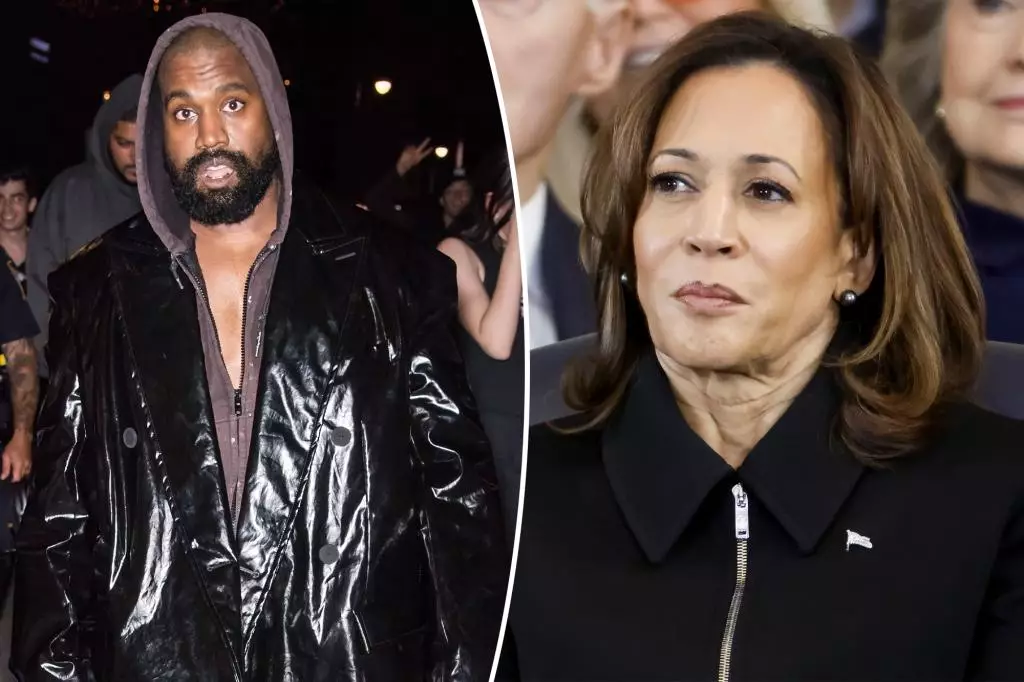In an eyebrow-raising moment on social media, Kanye West recently caused a stir with a tweet directed at former Vice President Kamala Harris. The polarizing figure, known for his unfiltered and often controversial statements, declared, “I used to want to f—k Kamala until she lost. I don’t f—k losers anymore,” reflecting on her electoral defeat to Donald Trump in the 2024 presidential election. Although the tweet was later deleted, it reignited discussions surrounding West’s history of provoking public figures and igniting backlash.
In a subsequent post, he further commented, “The democrats made me take the loser post down. Naw I’m kidding. Dey don’t control black people no more. Trump 4 life.” This bizarre combination of alleged defiance against perceived political control and a crude commentary on a respected political figure drew simultaneous disbelief and criticism. What has often been labeled as West’s characteristic bravado was, in this case, perceived as a significant lapse in judgment.
West, who is now married to Bianca Censori, carries a complex public image that oscillates between being a genius musical artist and a provocateur with a penchant for controversy. His latest escapade serves as a striking example of how celebrity tone can affect public discourse. The incident also underscores a broader cultural tension surrounding accountability among well-known figures. Given West’s past—he was banned from the same platform for anti-Semitic remarks in 2022—this latest episode begs the question: should celebrities be held to a higher standard, or does their platform grant them freedom of expression?
Moreover, this apolitical yet charged commentary raised eyebrows not only for its content but also for its implications regarding gender politics. West’s overt sexualized reference to a leading female politician is representative of an insidious trope that often undermines women’s authority in professional spaces. Such comments can perpetuate a culture in which female leaders are sexualized rather than respected for their political acumen.
In yet another layer of the spectacle, West recalled his long-standing rivalry with pop star Taylor Swift by revealing that she was the only person he followed on Instagram—a move that seemed calculated to reignite interest in their contentious history. Their relationship has been marked by notable moments of tension, starting famously with West interrupting Swift at the 2009 MTV Video Music Awards. This public feud continued in 2016 through his controversial song “Famous,” which included explicit lyrics about Swift, indicating that the grievances have not been buried, but rather simmer just under the surface.
As the world learned of his recent antics, it is crucial to recognize the media’s role in perpetuating these feuds. By amplifying the drama rather than focusing on accountability, media outlets risk normalizing harmful rhetoric and behavior. This has profound implications not just for the individuals involved but for society as a whole, particularly younger audiences who may idolize these figures without critical perspective.
In a world where social media serves as a stage for both celebrity and audience, the intersection of fame, gender, and political commentary continues to present challenges and opportunities for reflection. As individuals dissect West’s statements, a broader discussion emerges: Should celebrities like West strive for a message of empowerment and respect rather than one of shock and provocation?
As we look toward events like the 2025 Grammys, where West’s work will be measured against the backdrop of ongoing public scrutiny, the question remains: can public figures evolve from their past actions? An authentic apology signifies growth, yet as West shifts from one controversy to another, the possibility of substantive discourse often gets lost in the noise.
In this age of social media, the responsibility to promote thoughtful engagement belongs not only to the celebrity but also to the audience—an opportunity to foster conversations that transcend the superficial and resonate with enduring significance. West’s latest outburst may have briefly captured attention, but the real challenge lies in holding the discourse accountable and pushing for a culture where respect for one another prevails over sensationalism.

